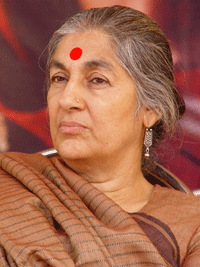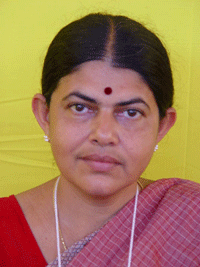 People's Democracy
People's Democracy
(Weekly
Organ of the Communist Party of India (Marxist)
No. 50
December 12, 2004
(Weekly
Organ of the Communist Party of India (Marxist)
|
Vol.
XXVIII
No. 50 December 12, 2004 |
THE
AIDWA’S SEVENTH NATIONAL CONFERENCE
CHARTING
THE WAY FORWARD
Sudha
Sundararaman


Newly elected president Subhashini Ali (left) and general secretary Sudha Sundararaman (right)
THERE were two important components to the report presented to the seventh national conference of All India Democratic Women’s Association (AIDWA) by its general secretary. The first section assessed the status of women in the context of international and national developments, and the second was a review of the AIDWA’s interventions, struggles and organisational growth in the period 2001-2004.
The
report generated a very meaningful and perceptive discussion, with 67 delegates
participating over two days. Their inputs gave additional insights and
contributed to the formulation of the AIDWA’s future programmes and thrust
areas.
To
encapsulate, briefly, some of the significant issues that emerged and that have
enriched the ensuing action agenda are as follows.
IMPERIALIST
ASSAULT
In
the international arena, the US aggression in Iraq and the threats to Palestine
and Cuba demonstrate that imperialism is on the offensive. The impact in Iraq,
with living conditions deteriorating sharply and with a woman getting raped
almost daily, with literacy levels falling and with continuing attacks on
civilians, indicts the US as a war criminal. Even UN agencies are losing their
independent role. The widest possible global resistance has to be built up to
rebuff this trend.
Implementation
of the neo-liberal policies throws up an alarming uniformity of experience for
women. They are further marginalised as they become a source of cheap flexible
labour. Much greater inequalities, exploitation, sexual violence and a dramatic
increase in global trafficking have been widespread outcomes. Militant joint
movements to counter this are essential.
Alternatives
to the neo-liberal policies being evolved in China are of importance, and have
to be acknowledged. At the same time, some worrying trends have to be addressed
and rectified.
NATIONAL
SITUATION
The
damages to women’s interests under NDA rule have been extensive. They cut
across economic, social and cultural spheres. Indeed, even though communal
forces have received an electoral setback, they are trying to use their existing
social base to polarise our society around communal issues. For instance, a
tableau of the Godhra incident was displayed in some areas of Gujarat on
Janmashtami day to whip up sentiments. The population issue is constantly posed
along communal lines, though it has linkages with other factors like poverty and
illiteracy.
Another
retrograde trend is the use of rituals by communal forces to mobilise women.
Additionally, the commercialisation of religious rituals is strengthening the
nexus between market economy and communal propaganda.
Under
the UPA, the space for democratic aspirations has increased. The significance of
the CMP of the UPA government, with its pro-woman and pro-poor assurances,
should not be underestimated. Unfortunately, the allocations and executive
measures needed to implement the schemes are not forthcoming. The AIDWA has to
keep in mind the importance of gaining tangible benefits for the large sections
of women on the ground. The commitments --- which include passage of reservation
bill for women; strengthening of the public distribution system (PDS);
introduction of Employment Guarantee Act; legislation against domestic violence;
increased allocations for health and social sectors --- need to be realised.
Only broad-based mobilisations and continuous lobbying can convert these into
realities.
The
policy of targeting the poor has become a way of actually excluding the poor
from the ration system and the whole PDS has to be revamped by reverting to
universalised coverage.
The
continuing oppression of Dalit women and the poor implementation of the SC/ST
Act was highlighted. Marginalisation and exploitation of tribal women is
alarming, and they are denied access to marginal forest produce, but the Draft
Tribal Policy does not mention this aspect at all. Recently, the crisis in
agriculture has led to an exodus of people in search of livelihood. Men, women,
whole families are leaving their villages, but the problem of large-scale
distress migration has not yet been recognised by the government. The
invisibility of this problem has to be exposed.
The
increase in violence against women, sexual harassment, the lack of effective
time bound legal redress, the distortions in media and derogatory attitudes
inciting more violence, the issue of death penalty --- all emerged as major
flashpoints. The experience of Tripura in combating terrorism was highlighted as
something quite remarkable and the Tripura comrades were greeted for their
tremendous courage and sacrifice.
The
drastic fall in child sex ratios, especially amongst well-off educated sections,
due to dowry, son preference and misuse of medical technology was highlighted as
an area of deep concern. In spite of the PNDT Act having been passed, action
against doctors has been very lax, whereas the criminalisation of the medical
profession by some doctors has led to a lot of debate. The gamut of
discriminations that have led to this distortion and the increased abduction or
purchase of ‘brides’ from poorer areas reveals the extent of violence latent
in sex selection. A major campaign is called for.
As
part of strengthening the AIDWA’s interventions, valuable contributions were
made by the delegates. The summing up of work and organisation report reflected
the multidimensional nature of the AIDWA’s work, and the linking up of local
action with the larger policy framework. Future agenda would include the
following:
Strengthen
our movement for the reservation bill for women.
Strongly
oppose the two-child norm as a population control measure.
When
addressing the issues of Muslim women, mobilise initially around day to day
and livelihood issues.
Improve
the functioning of SHGs and ensure that they do not get bureaucratised.
Along
with regular political campaigns against fundamentalist forces, more area
level interactions to be encouraged.
Continue
with sectoral struggles. Take up issues of domestic workers, home based
workers, tribals, migrants, Dalits with concrete demands.
Address
the needs of specific groups like the disabled, sportspersons, young single
women, and women headed households.
STATUS
OF ORGANISATION
While
the AIDWA membership has increased, the problem of uneven development persists.
Also,
the participation of women in activities has to be ensured. The principle of
accountability of the leadership and a collective understanding along with
teamwork has to be strengthened. New initiatives should be encouraged. Promotion
of cadres at the proper time, and ensuring social composition of committees are
important. Making the unit committees function independently lies at the core of
democratising the AIDWA work.
The
unity of the organisation is very important and collective effort at all levels
will enable the AIDWA to take on the problems of women better. These were a few
of the significant organisational aspects that were highlighted in the summing
up by Brinda Karat.
The
accounts were placed by the treasurer, Kalindi Deshpande, and this plus other
reports were unanimously passed by the delegates.
PRESENTATIONS
ON WOMEN, WORK
Economists
Jayati Ghosh and Madhura Swaminathan made brief but very useful presentations on
two issues of crucial importance to women. Jayati Ghosh pointed out how many
aspects of the government policy had generated an employment crisis. She said
pressure for implementing the Employment Guarantee Act (EGA) had to be
sustained, otherwise the government would try to scuttle it. She appreciated the
role being played by the AIDWA in inserting a gender component in all policy
decisions, and emphasised the need for ensuring that the Act reaches women by
redesigning the scheme to include women friendly tasks.
Madhura
Swaminathan described how the PDS had been systematically dismantled and, in a
scenario of high anaemia and malnourishment, stressed how targeting had actually
eliminated the poor people’s access to ration. She emphasised the need for the
AIDWA to prioritise the struggle for food security, and for bringing back
universalisation of the PDS.
GROUP
DISCUSSION ON COMMISSION PAPERS
Background
papers were prepared on seven important issues of immediate relevance to women.
These were as below:
Trafficking
in women;
Dalit
women --- caste, class, and gender oppression;
Agrarian
crisis, migration and impact on women;
Towards
a liquor policy for India;
Problems
of poor urban women;
Female
foeticide and infanticide; and
Fundamentalism
and women.
Proper
prosecution and witness protection in the Best Bakery case;
Condemning
the degrading portrayal of women in media and demanding better media
monitoring; and
Against
imperialist assaults by the US.
There
was a lively debate in smaller groups, and the rich experiences of the states
were presented in a plenary session. The demands charters were adopted as
resolutions for action. Along with the resolutions demanding comprehensive
implementation of the CMP, especially EGA and Women’s Reservation Bill, other
important resolutions included
CONSTITUTIONAL
AMENDMENT
In
a move to increase the role of office bearers, a constitutional amendment was
brought in, according to which a new category of assistant secretary was created
(along with the already existing secretaries and secretariat), to be filled in
if found necessary.
The
seventh AIDWA conference increased the number of members in the central
executive committee (CEC) to 96 so as to allow for a better social composition
and to respond to the specific needs of some of the states. The panel was
introduced by Brinda Karat and elected unanimously.
Apart
from the president Subhashini Ali and working president Shyamali Gupta, 9 vice
presidents were elected. A change of guard occurred with general secretary
Brinda Karat proposing Sudha Sundararaman as the new general secretary. Six
national secretaries and five assistant secretaries with three secretariat
members were also elected. Bonnani Biswas was elected the new treasurer.
Subhashini
Ali placed on record the tremendous contributions made by Brinda Karat in
building the organisation over the decades, and the impetus given to sectoral
issues, which has brought the AIDWA to national pre-eminence as never before.
The closing session saw an outpouring of affection from the delegates as they
all surged onstage to shower Brinda Karat with their tokens to show how much her
work had been appreciated.
A
call for action was issued by Sudha Sundararaman to commemorate December 10
---Human Rights Day --- as a day of struggle to demand implementation of the
EGA. The March 8 joint campaign would be around implementation of the CMP. The
inspiring seventh national conference of the AIDWA came to a close with
Subhashini Ali’s inspiring call for one crore membership by the next
conference, and slogans to uphold the AIDWA’s demands.